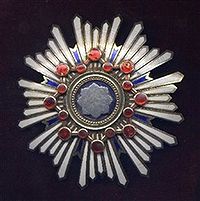Order of the Sacred Treasure
| Order of the Sacred Treasure 瑞宝章 |
|
|---|---|

Star of the Order of the Sacred Treasure
|
|
| Awarded by the Emperor of Japan |
|
| Type | Order |
| Awarded for | Long and/or meritorious civil or military service |
| Status | Currently constituted |
| Sovereign | His Imperial Majesty The Emperor |
| Grades | 1st through 8th Class (1888–2003) Since 2003: Grand Cordon Gold and Silver Star (Rays, Principal Grade) Gold Rays with Neck Ribbon (Cordon, Middle Grade) Gold Rays with Rosette (Cordon, Junior Grade) Gold and Silver Rays (Double Rays) Silver Rays (Single Ray) |
| Statistics | |
| Established | 4 January 1888 |
| Precedence | |
| Next (higher) | Order of the Rising Sun |
| Next (lower) | Order of Culture |
|
Ribbon of the Order of the Sacred Treasure – new type |
|
The Order of the Sacred Treasure (瑞宝章 Zuihō-shō?) is a Japanese order, established on 4 January 1888 by Emperor Meiji as the Order of Meiji. Originally awarded in eight classes (from 8th to 1st, in ascending order of importance), since 2003 it has been awarded in six classes, the lowest two medals being abolished that year. The most widely conferred Japanese order, it is awarded to those who have made distinguished achievements in research fields, business industries, healthcare, social work, state/local government fields or the improvement of life for handicapped/impaired persons.
Originally a male-only decoration, the order has been made available to women since 1919; it is awarded for both civil and military merit, though of a lesser degree than that required for the conferment of the Order of the Rising Sun. Unlike most of its European counterparts, the order may be conferred posthumously.
The Order can be awarded in any of six classes. Conventionally, a diploma is prepared to accompany the insignia of the order, and in some rare instances, the personal signature of the emperor will have been added. As an illustration of the wording of the text, a translation of a representative 1929 diploma says:
The insignia of the order incorporates symbols for the three imperial treasures: the Yata Mirror, so sacred that not even the Emperor is allowed to look at it; the Yasakani Jewel, which is made of the finest jade; and the Emperor's personal sword.
The star for the Grand Cordon and Second Class is similar to the badge as described above, but effectively with two sets of Maltese crosses, one in gilt and one placed diagonally in silver. It is worn on the left chest by the Grand Cordon, on the right chest (without any other insignia) by the 2nd class.
...
Wikipedia
